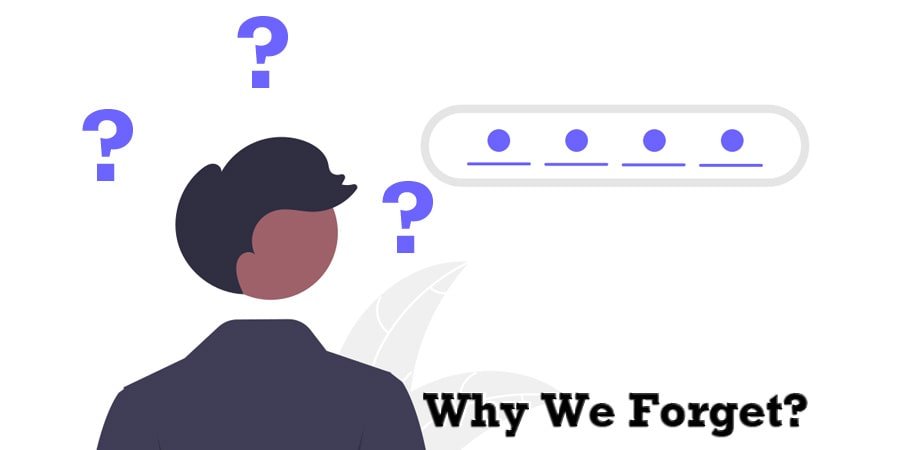Why Do We Forget?

Imagine a world without forgetting; would we be better or worse off?
Have you ever walked into a room and completely forgotten why you went there? Or struggled to remember a name that’s on the tip of your tongue? If so, you’re not alone. Forgetting is a universal experience that touches everyone, regardless of age. It’s a natural part of being human.
But have you ever wondered why we forget? Is it just a glitch in our brain’s wiring, or is there something deeper at play? In this blog post, we will explore the fascinating science behind forgetting, uncovering the reasons why our memories sometimes slip away. From the latest research to practical tips for sharpening your memory, we will help you understand why forgetting is not just frustrating – it is also necessary.
Why Do We Forget?
Paying Insufficient Attention
One of the primary reasons we forget is a lack of attention. If you don’t focus on the information at hand, you’re unlikely to remember it later. Just like a spotlight highlights what’s important on a stage, your brain needs to focus on what’s important for it to learn effectively. Distractions and divided attention make it difficult for your brain to fully engage with new information.
Psychologists have shown that attention is crucial for learning, but interestingly, we can sometimes learn things implicitly – without consciously trying. However, for most of us, focusing fully is key to remembering.
Failing to Encode Properly
Even when we do pay attention, our brains sometimes fail to store the information properly. To remember something long-term, you need to move it from your working memory to your long-term memory. This process requires practice and reflection.
Thinking deeply and linking new information to what you already know (a process called elaboration) makes the information more meaningful and easier to remember. It’s not always easy, especially if the subject does not interest you, but it is essential for effective learning.
Testing yourself is a powerful way to reinforce your memory. Repeatedly testing your recall strengthens the connections in your brain, making it easier to retrieve the information later.
Memory Decay
Sometimes, even when you have paid attention and encoded information properly, memories fade over time. This phenomenon, known as memory decay, is a natural part of how our brains function. We are constantly bombarded with new information, and our brains can’t hold onto everything.
Interestingly, this is not necessarily a bad thing. Forgetting helps our brains prioritize important information and let go of details that aren’t useful, like what we had for breakfast last Tuesday.
Interference
Another common reason we forget is interference. This happens when new information conflicts with what we’ve already learned, or when old memories disrupt our ability to learn something new.
There are two types of interference:
- Proactive Interference: When old information makes it harder to learn new information.
- Retroactive Interference: When new information disrupts your recall of older memories.
Both types of interference can make it difficult to retrieve the right memory at the right time.
Forgetting the Cues
Sometimes, we can not recall information simply because we have forgotten the cues that help us access it. When you learn something, you also encode the context in which you learned it – such as the environment, mood, or even background sounds. If these cues are not present when you try to recall the information, it can be harder to remember.
To enhance your memory, try to study in a similar context to where you’ll need to recall the information. The more distinct and specific the cues, the better they will work in helping you remember.
Ways to Reduce Forgetting
While forgetting is natural, there are several strategies you can use to improve your memory:
Eat a Healthy Diet
A balanced diet supports both brain and heart health. Focus on fruits, vegetables, whole grains, and lean proteins. Avoid excessive alcohol and steer clear of drugs, as they can impair memory.
Use Visual Aids
Our brains are better at remembering images than words. Incorporate visuals into your study materials or presentations to reinforce your memory.
Exercise Regularly
Physical activity boosts memory performance, even with short, low-intensity exercises. Just a bit of movement can make a big difference.
Get Enough Sleep
Sleep is crucial for memory consolidation. Aim for seven to nine hours of sleep each night to give your brain the rest it needs.
Rehearse Information
Repetition is one of the most effective ways to solidify memories. Keep reviewing and practicing the information until it sticks.
Conclusion
Forgetting is a natural and necessary part of being human. While it can be frustrating, understanding the reasons behind it can help you develop strategies to improve your memory. By focusing your attention, properly encoding information, minimizing interference, and using the right cues, you can reduce the rate at which you forget. Remember, it is all about giving your brain the best chance to hold onto what truly matters.